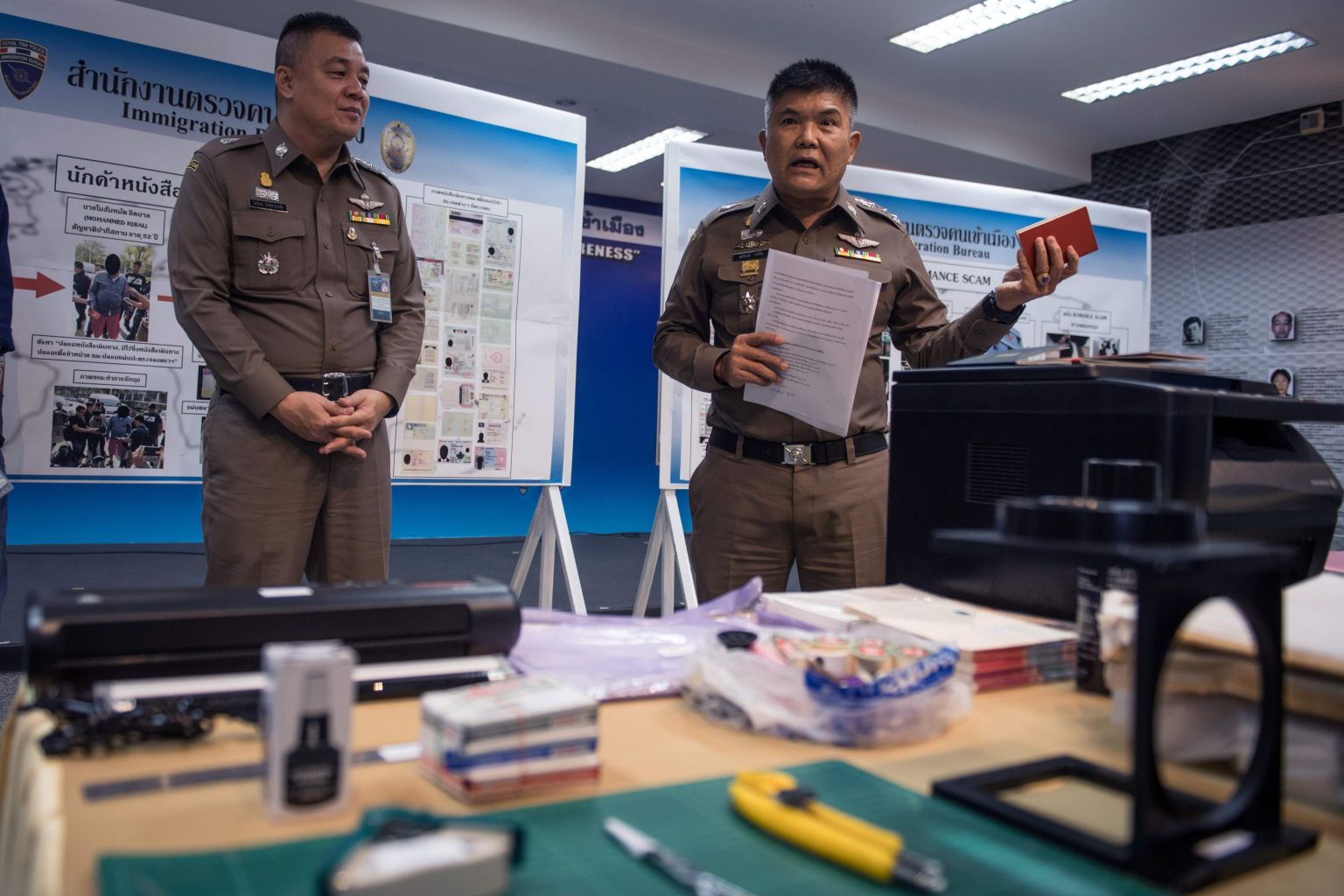Thai police nab Pakistani with fake Singapore passports as forgery cases persist
Sign up now: Get insights on Asia's fast-moving developments

Commander of the Immigration Bureau Lieutenant General Suttipong Vongpint (right) said the forger was working on faking documents for a long time.
PHOTO: AFP
BANGKOK - Fake Singapore passports were put on display on Friday (Jan 19) by Thai police who nabbed a Pakistani national for allegedly producing fraudulent travel documents.
But police denied the fake passports were landing in the hands of Islamist militants.
And despite better technology being introduced in passport production and authentication, experts say the problem of fake passports shows no sign of fading.
The incidence of imposters - those who use other people's passports - also appears to be on the rise.
Mohammed Iqbal, 52, was arrested on Sunday (Jan 14) at Phasi Charoen district in Bangkok with three fake Singapore and one fake Indian passports. He also had in his possession plates and laminates to forge entry visas to France, Italy and Spain.
Police say Iqbal's case was linked to that of a sophisticated Iranian forger called Hamid Reza Jafary, whose network was busted in 2016 after key arrests by the Thai police.
At a press conference about Iqbal's arrest on Friday (Jan 19), Immigration Bureau chief Suthipong Wongpin told reporters: "Don't rush to assume that it relates to only the (Islamic State in Iraq and Syria). From our investigation, this producer would hand his goods to traders… The goods could be sent to any group."
His comments came three days after Deputy Prime Minister Prawit Wongsuwan was cited by the Bangkok Post as saying that Iqbal "wanted to bring fighters from the Middle East to our country, but we stopped that".
According to Immigration Bureau deputy commissioner Ittipol Ittisarnronnachai, Thai police arrested 10 producers of fake passports in the past two years.
Counterfeit French and Italian passports were coveted by Middle Eastern buyers because it was relatively easier for them to pass themselves off as citizens of these countries, he said.
The fake documents, which tend to be made to order, cost upwards of 18,000 baht (S$745) each, according to police.
Investigators told The Straits Times that Iqbal, who had been operating in Thailand for many years, married a Thai woman and as a result was able to extend his stay in the Kingdom.
Thailand, a major tourism destination as well as regional transit hub, received more than 35 million visitors last year.
Asked about the incidence of travellers detected with fake passports, Police Major-General Ittipol said the numbers have remained stable over the years.
Figures from a fake passport detection system developed by the International Organisation for Migration (IOM), and funded by the Canadian government, give an indication of the scale of the problem. Its Verifier Travel Document and Bearer equipment and software, designed to check suspicious passports within 10 seconds, have been installed in 15 mostly Asian countries, including China, Malaysia, Myanmar, Thailand and Vietnam.
Immigration authorities in these 15 countries used the system to pick out 512 fraudulent passports last year. This made up about one-fifth of the total number of suspected passports that officials chose to run through the system.
According to figures generated by this system in the 15 countries, cases of fraudulent documents fell from 92 per cent to 58 per cent between 2016 and 2017. The cases of imposters jumped from 8 per cent to 42 per cent.
Mr Donato Colucci, IOM's senior regional immigration and border management specialist, told The Straits Times: "Globally speaking, data show the phenomenon (of fake passports) is not decreasing. Hence this analysis could be valid also in this region."


